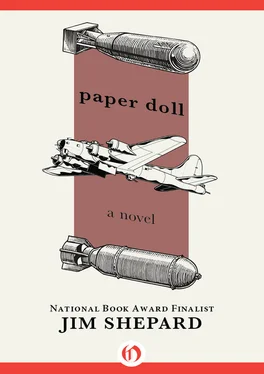“Pretty good, isn’t it?” Snowberry said. Bryant still had his diary open, though he’d been on one page for a good while. He nodded, and flipped around.
He remembered the sound of the water and the little waves from the boats tied up in the bay. They could hear the boards and planks creaking a long way off. In the morning they were wet and the fog made the water disappear. He remembered the speckled metal cup with the big ACE stenciled cryptically on it, and the heat of the coffee with no milk through the cup to his hands. He remembered the stray dog that had snuffled around while the sun was still pink and low and everything was wet and cold and the dog’s nose snorting in the morning air. Its back leg was badly hurt and it nosed and sniffed them but wouldn’t let his father get near to help. “Poor son of a bitch,” his father had said, and he remembered thinking that the dog was going to die.
That night the projector broke down. Bryant and Snowberry took a reel of Buck Privates from the can and unspooled part of it, holding an open-mouthed Lou Costello up to the light. On another reel they found June Allyson, in color besides.
“They must’ve mixed up the reels,” Bryant said. “Too bad the projector broke.”
“Some of these guys wouldn’t’ve even blinked,” Snowberry said.
They had remained in the darkened briefing room after everyone else had drifted away. Snowberry looked farther down the reel for more June Allyson, whom he called Prince Valiant. He was starting a good-sized tangle of celluloid at his feet. He crooned softly to himself.
Poor Stormy, who’d arranged all of this, sent a tech sergeant off to Supply for a manual. They needed one, the projectionist had theorized, since it evidently wasn’t with the machine. Most of the men had already left in disgust or boredom. The lamp for the machine was still on and light flickered on the sheet hung as a screen. There was nothing to do.
Lewis was sprawled between two folding chairs, flipping through something. Piacenti and Pissbag Martin were playing blackjack on a fifty-gallon drum labeled, mysteriously, USARC.
Bryant straddled a chair and asked Lewis what he was reading.
“Gabriel’s pilot’s manual,” he said.
The others looked up from the card game.
“He won’t miss it,” Lewis said off-handedly. “He only studies it twenty-three hours a day. This is his hour off.”
“Lemme see,” Snowberry said. “What’s it say?”
“It says you should get to know your crew,” Lewis said. “Their strengths and weaknesses.” Snowberry was making shadow animals with his fingers in front of the projector lens. “Listen to this: ‘Of all branches of the Service, the Air Corps must act with the least precedent, the least tradition.’”
Snowberry looked over at him. “That’s not a pilot’s manual,” he said.
Bryant looked closer. “It’s something called Bombs Away, ” he said.
“It’s a book Bean brought with him,” Lewis said. “The kind they give kids in school about the Army.” He continued reading. “‘Nearly all the tactics and formations of infantry have been tested over ten thousand years. Even tanks, though they operate at a high rate of speed, make use of tactics which were developed first by chariot and then by cavalry. But the Air Corps has no centuries of trial and error to study; it must feel its way, making its errors and correcting them.’”
“Oh, God,” Snowberry said. They laughed. Hirsch and Willis Eddy wandered back in, and sat beside Bryant. Lewis flipped the manual to Snowberry, who turned a page and went on aloud:
“‘The pilot and co-pilot must fly the ship, that is true, but they take their directions from the navigator, for he knows where they are and where they are going and how to get there.’”
“Where are we, Hirsch?” Lewis asked.
“England,” Hirsch said.
“‘Arriving at the target, the bombardier must take command, for it is he who must drop the bombs on the target safely.’”
“This just confirms what I been saying all along,” Willis Eddy said. He was a big, slow-moving boy who liked to say he reminded people of Gary Cooper. “You’re all just here to get me to the target safely.”
“Eddy here was hell with the practice bombs,” Pissbag Martin said.
Eddy shrugged. He cultivated the impression that he was hard to rattle. “My instructor used to say, ‘Dropping your eggs on a dime from twenty thousand feet is easy. Think of this simple analogy.’”
“What is this Southern drawl stuff?” Snowberry asked. “Who’re you supposed to be, Henry Fonda?”
“He used to say,” Eddy continued, “it was like getting on a bike, riding it past a thimble, and dropping grains of rice into the thimble.”
“Pretty big thimble, in your case,” Lewis said.
Bryant thought it might be time for some esprit de corps. He said, “The whole wing dropped early on that mission. Willis wasn’t lead bombardier.” Eddy’s bombs, with everyone else’s, had been dropped short on Paper Doll ’s most recent mission. Eddy was unperturbed and didn’t seem to feel he needed defending.
Snowberry flapped the book to show he was going to go on reading. “‘All during flight,’” he read, “‘the engineer commands the engines and sees that they continue to function well.’” Bryant felt himself reddening, but no one commented. “‘The radio man is the voice and ears of the plane, keeping contact with squadron and base.’”
“You know, it bothers me that I’m a member of an important team alongside the fat kid who never got into games at the playground,” Lewis said.
“‘And all the time the aerial gunners are charged with the defense of the ship. On the sharpness of their eyes and the accuracy of their aim the safety of the whole crew depends.’”
Lewis snorted.
Snowberry said, “Aren’t you the Hottentot! Are we so bad?”
Marksmanship was a sore point with Lewis. He said, “We’re not the Tennessee riflemen up there, if you were wondering.” He had been spending time with them lately on deflection shooting, and not having much success. They had only had time to learn, and relied upon, what the Air Corps officially termed the Zone System. The Zone System was defined as pointing at the offending object, leading it a little, and filling the sky with bullets.
“I think the boys’re doing fine,” Willis Eddy drawled.
“The only way to get through this,” Lewis said, “I figure, is to make the Heinies look for a bigger pushover. You have to turn yourself into some kind of risk.”
“Hell, these guys can’t shoot,” Pissbag Martin said. “The guns’re there so they can show they’re pissed off at being attacked.”
“Sometimes I do get the idea we’re just sort of feeling our way, here,” Snowberry admitted. “It’s like one day I just woke up operational.”
“I don’t know how Billy Barty could shoot straight from that ball turret,” Eddy said. “Twisted up looking down through your legs and all that hooey.”
Pissbag Martin shook his head. “I don’t go anywhere at twenty-five thousand feet you can’t take your parachute.”
“What if we do like you say, Lewis?” Bryant asked. He was thinking while they had been talking that he was going to be up all night again, dreaming of a sky filled with Germans. “What if we do like you say, and then get it?”
“We have a saying for that,” Lewis said. “We say, ‘Tough shit.’”
They were quiet. “Hit me,” Pissbag Martin said, and Piacenti flipped a card onto his two.
“Ah, if God had wanted us to shoot down Germans, he would’ve kept us guys out of gunnery,” Snowberry said.
“‘A boy who can hit a clay pigeon on a skeet range can knock a Messerschmitt out of the air,’” Bryant said. “The instruction manual used to say that.”
Читать дальше












